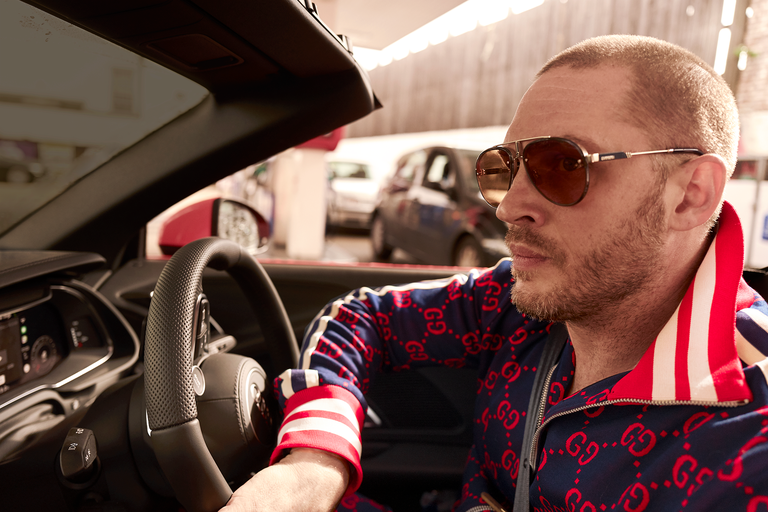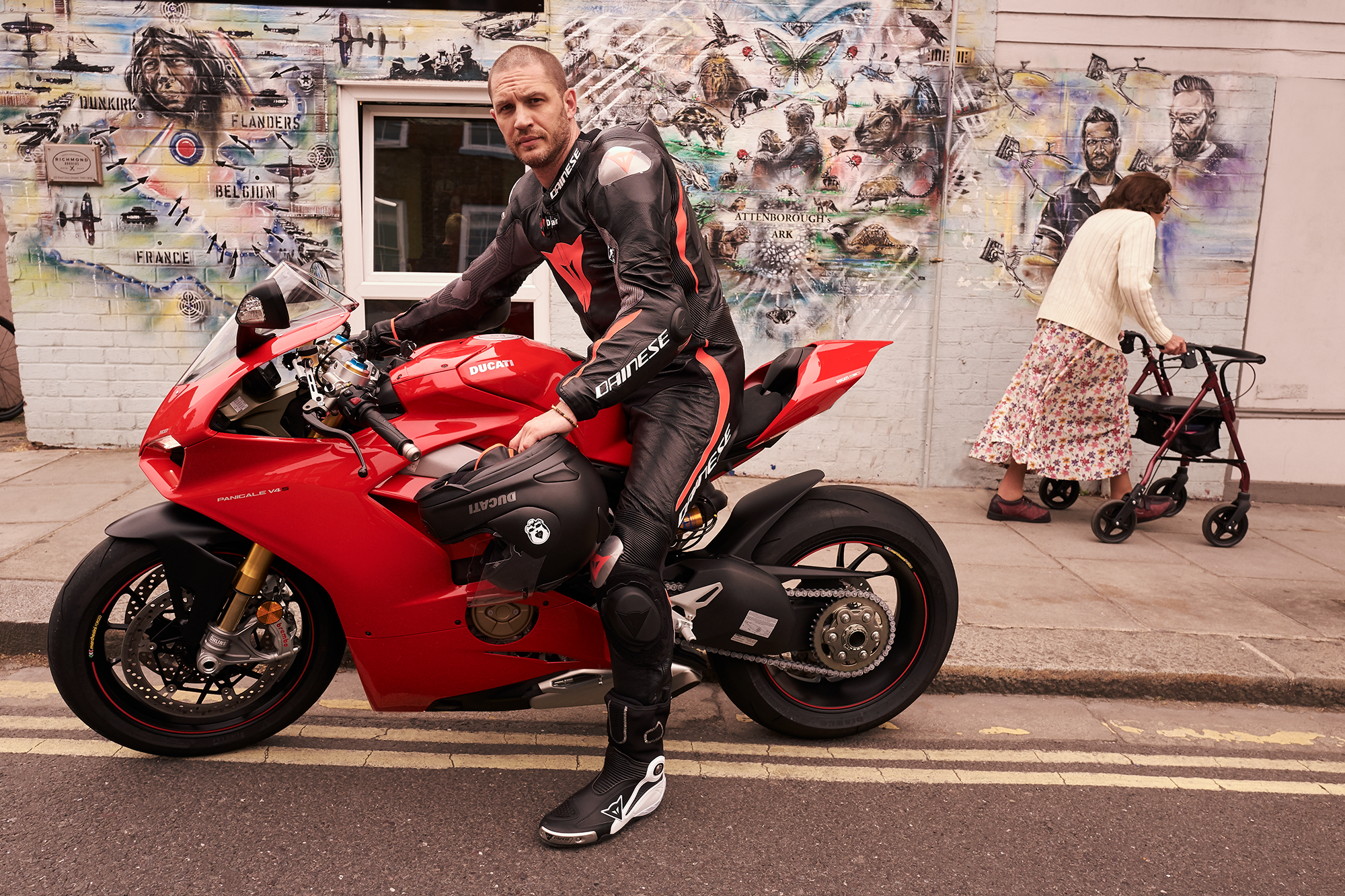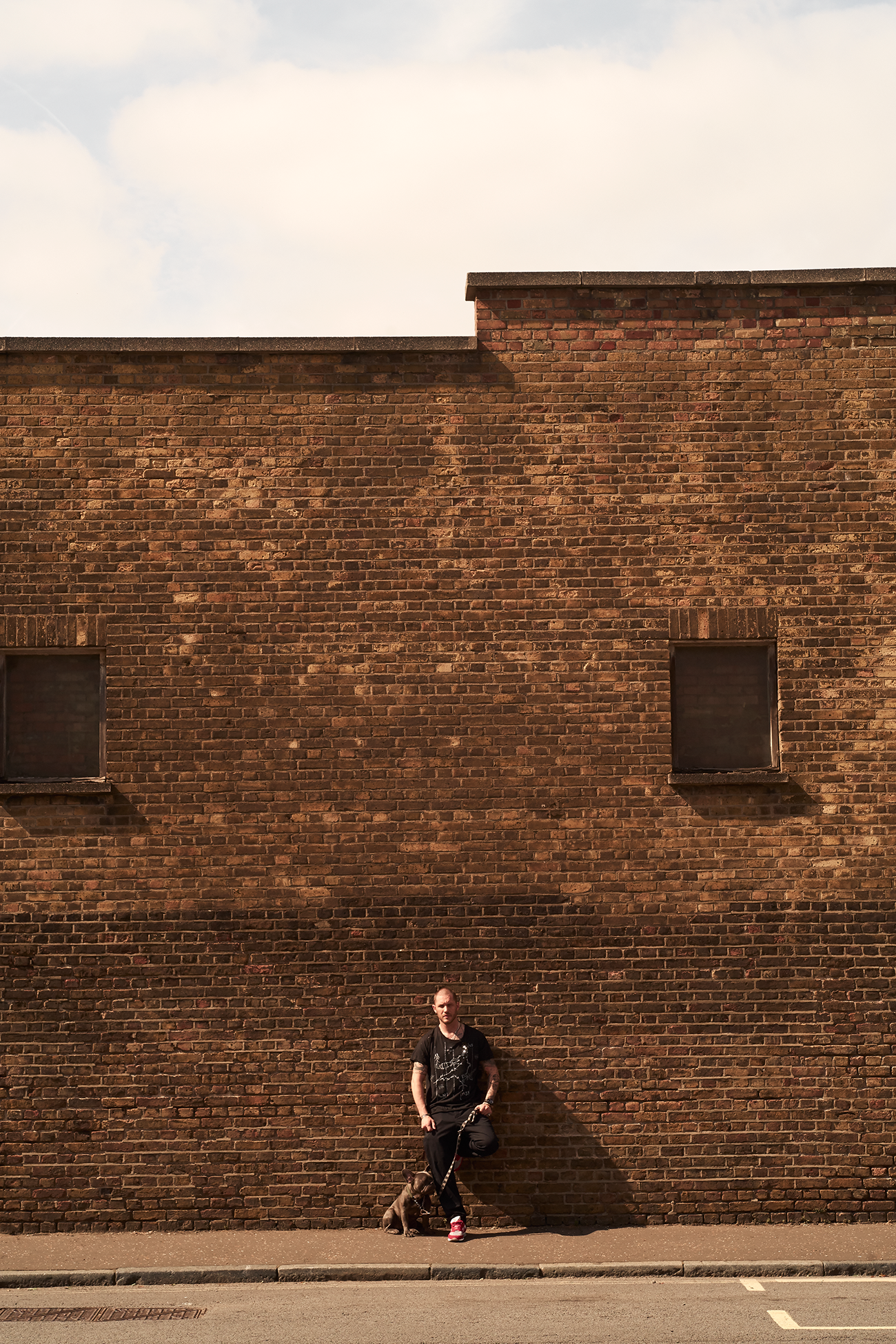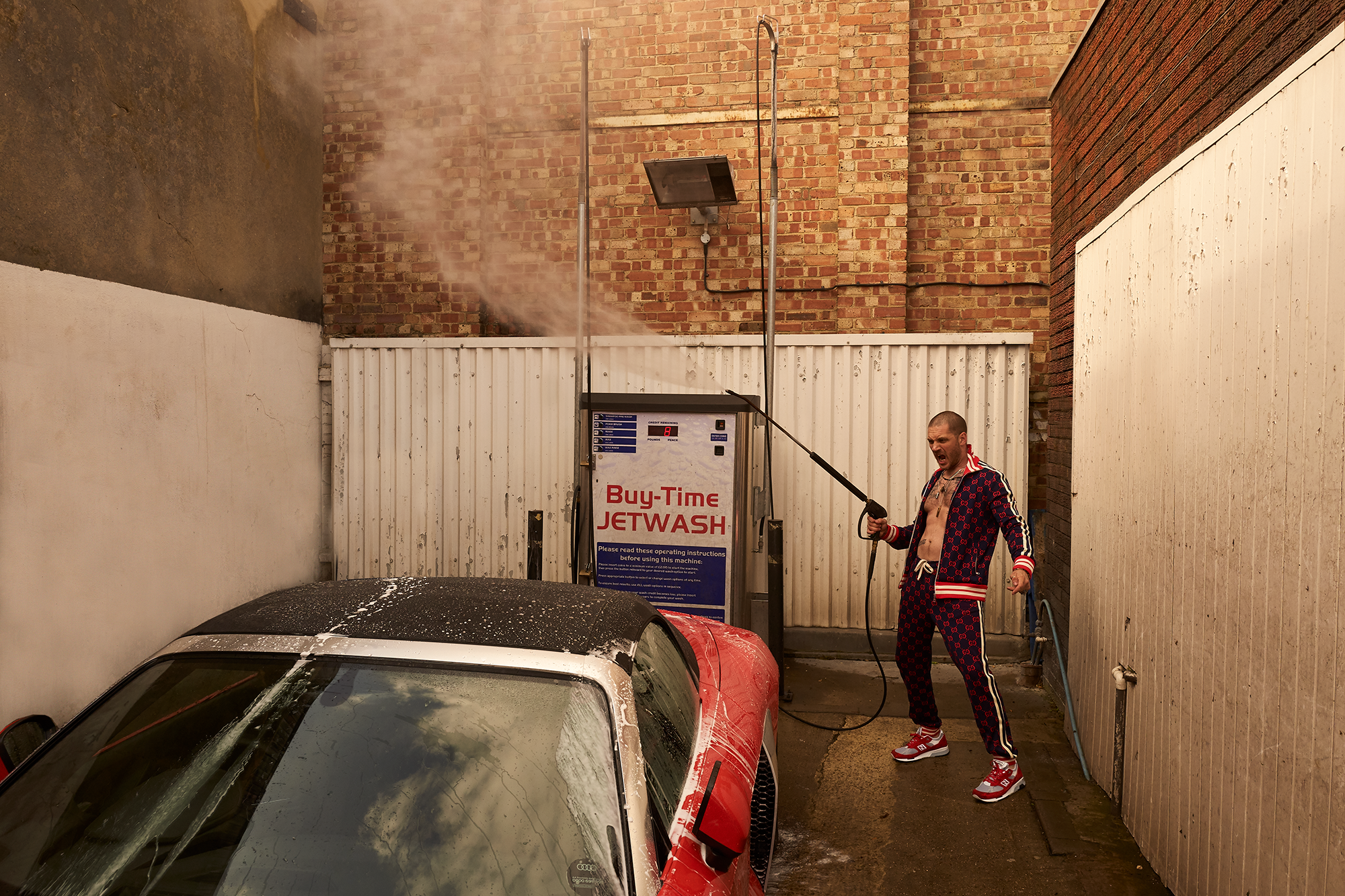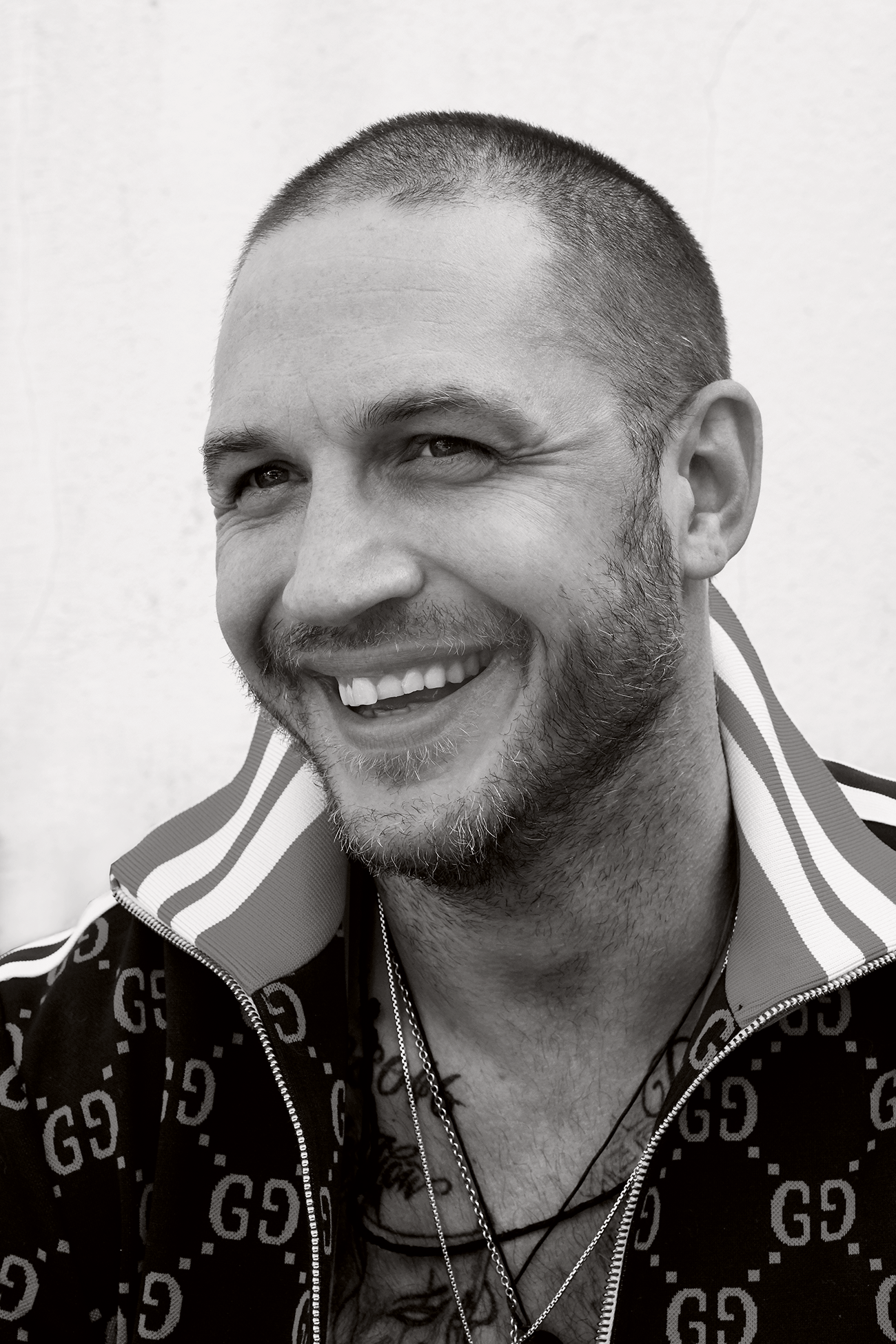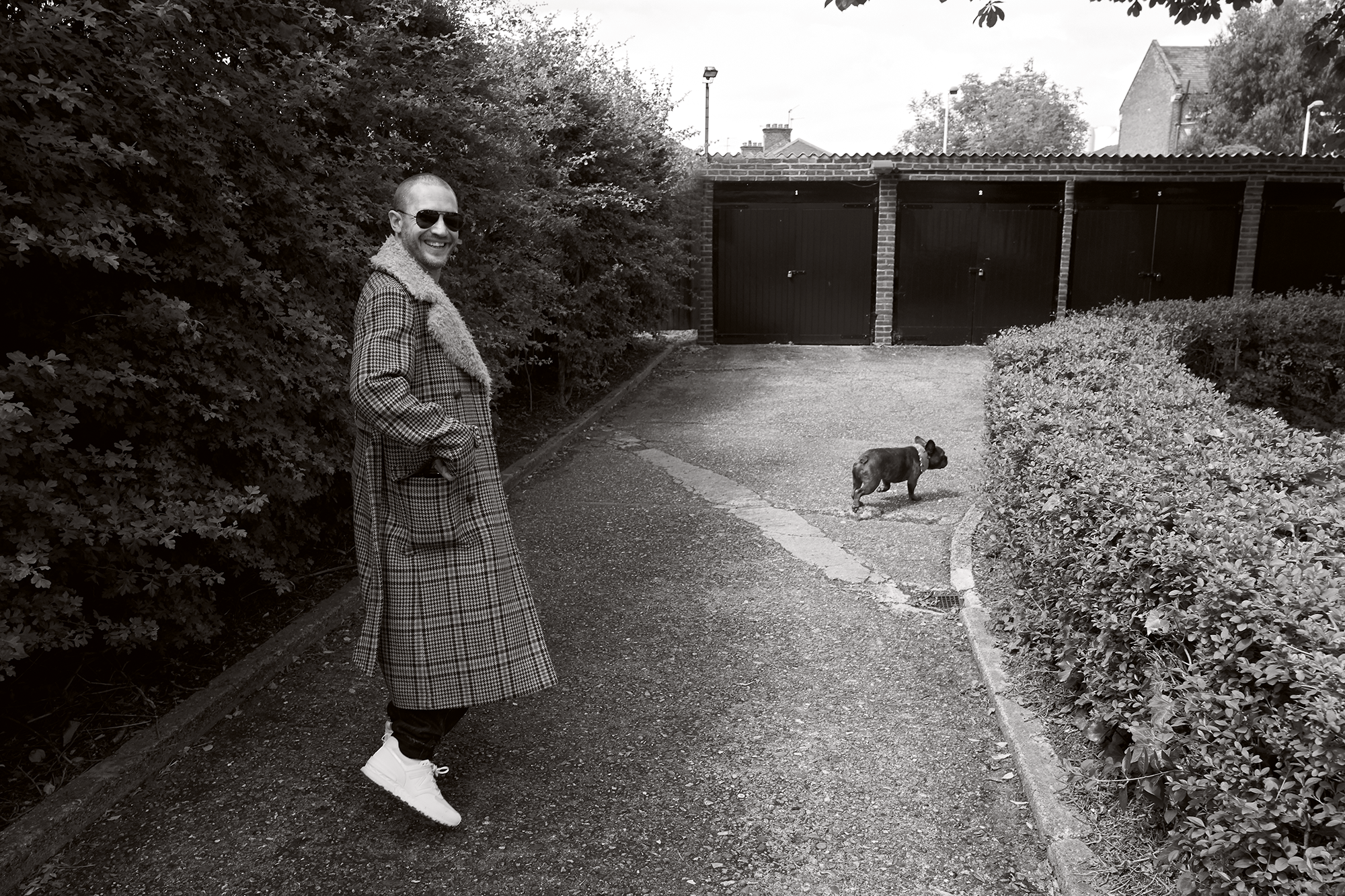So it’s around two o’clock on a grey June Friday afternoon and Tom Hardy is trying to talk me into walking out of the Richmond branch of Pets at Home with the lid of a spherical fish tank stuffed up my shirt.
“You’d look three months pregnant!” he says. “No one’s ever going to think that I would shoplift, and look at you…”
Winona Ryder, I say. Winona Ryder.
“But I’m not actually taking it out of the shop,” he points out. “I’m taking you to hospital, sharpish. Let’s move!”
I’m 90 per cent sure he’s joking, and I’m 75 per cent sure I wouldn’t do it anyway, but then again he is professionally adept at the art of persuasion — “hustle” he calls it — and the lady pushing the toddler in the trolley down the aquaria aisle doesn’t look like she’d grass, and my shirt is quite roomy and I could probably fit the fish tank lid up there without much difficulty, and as the seconds tick by I’m wavering closer to 60.
But let’s back up a bit. We’re in Pets at Home, “the United Kingdom’s leading pet supplies retailer”, because Tom Hardy wants to make a Captain America shield for his two-and-a-half-year-old kid — he asks me not to reveal the name or gender — and he’s looking for circular objects that he could jerry-rig for the job. So far he has considered a bin lid, a dog Frisbee, and a cardboard scratching mat meant for kittens. He’s also suggested I might want to steal him a hubcap (“you could rip one off a car on the way out”) but now he’s all over the idea of the fish tank lid and his brain’s whirring: “We can just run hardcore gaffer tape with a bit of towel, a flannel, in there…” Until he spots the price.
“A hundred and thirty-five quid? Forget it!” You could get some fish for it, I suggest. “Yeah, and more responsibility,” he says. The £5 kitten scratch mat it is.
But let’s back up a bit more. We’re in southwest London, where Hardy lives with his wife, the actress Charlotte Riley, and their toddler, because he has just returned from near back-to-back shooting of two very typically Hardian projects: Fonzo, an independent movie written and directed by Josh Trank about the last few months of the life of Al Capone (Hardy twist: he’s suffering from dementia brought on by syphilis) and Venom, the film with which Sony plans to launch its major foray into the world of Marvel, and in which he plays a street-wise journalist who gets possessed by an alien parasite (Hardy twist: the alien eats people; his journalist host doesn’t necessarily mind).
The films serve as exemplars of the kinds of projects Hardy likes to do, and the kinds of projects others want him for: gnarly, eccentric character studies of so-called tough guys, which he’s very good at — Charles Bronson in Bronson; the Kray Twins in Legend, treacherous fur trapper John Fitzgerald in The Revenant — and roles in absolutely enormous studio movies with the potential to make absolutely enormous amounts of money, at which he’s also proving pretty proficient — Bane in The Dark Knight Rises; Max Rockatansky in Mad Max: Fury Road; the doomed Spitfire pilot in Dunkirk.
Now that Hardy is home, he’s spending as much time as possible with his children — he has a 10-year-old son, Louis, from an earlier relationship, who also lives nearby — and, as he says, not unhappily, as we drive to Pets at Home in a red estate he’s been loaned by Audi, “I’m covered in gravy and chocolate and snot.”
To add to the challenge, he’s two days into potty-training his two-and-a-half-year-old. He shows me photos on his phone of a misfire on the living room carpet and the disgruntled selfie he took shortly after: “morning horror”, he calls it.
“It’s a gear shift down from where I’ve been,” he says, scrolling through a playlist on his in-car computer (Jeff Beck, Steve Miller… though in the passenger-door pocket is a copy of the seminal 2017 album Who Invited This Lot? by kids’ TV presenter Andy Day and his band The Odd Socks). “Actually that’s not true. It’s five gear shifts down from where I’ve been, and then it’s up five gears. So it’s two vehicles and one space to park it in. Two completely different vehicles, and both need someone at the wheel. That’s a shit analogy. A father analogy that…” He gives up. “Baby brain. What I’m saying is, there is no harder job on the planet, and more important, than parenting. You’ve got the military, police, doctors, service personnel — massive respect, huge consequences — but parenting?” He gives a high, wheezing laugh. “It’s beyond a job, isn’t it.”
Hence the Captain America shield. “It’s got to be made by Daddy and it’s got to show effort,” he says. “It’ll get played with for three fucking minutes and that’ll be it,” he admits. “But it gives us a mission.” And if there’s anything Tom Hardy loves it’s a mission.
We leave Pets at Home, Hardy with the kitten scratching pad under his arm, to head to Homebase next door to pick up a handle of some kind and tape. We linger outside so that Hardy can have a vape, which he does constantly, like Lewis Carroll’s Caterpillar, except he’s perched not on a mushroom but on the railings next to the trolleys. He’s wearing brown New Balance trainers, grey tracksuit bottoms, a baseball cap with sunglasses resting on the visor, and a grey T-shirt made for him by a fan featuring a picture of his beloved dog Woody, who died last year, wearing a shirt and tie. “I miss him,” he says.
We survey the carpark. I point out, for no particular reason, that we’re next to a pile of rolled turf.
“Rolled turds?” says Hardy. “That’s quite a thing to call someone…” And he guffaws. (Hardy has two main laughs, which he deploys liberally. The first is a high wheeze, like he’s been crane-kicked in the solar plexus. The second, a throaty “hur hur hur!”, might be how Pat Butcher would laugh if her EastEnders storylines had afforded it. This one is the second kind.) Then, almost without pause, “I grew up around here.”
He indicates the compass points of his neighbourhoods, from Richmond, to our left, which is leafy and chi-chi, to East Sheen, on our right, where he grew up, which is semi-suburban and blissfully nondescript, and where his parents still live. “Actually I’m Mortlake, which is an old plague pit. ‘Mort-lake’ — lake of the dead.”
How many people were buried there? I ask.
“I don’t know?!” he replies, incredulously. “How many people do you put in a plague pit?”
Hardy was born on 15 September 1977 to Edward “Chips” Hardy, an advertising executive, and Anne Hardy, an artist, and grew up in a pleasant-looking house on a pleasant-looking road not far from the South Circular. We drive past it later, and he threatens to drop in on his mother, but says she’s likely to clam up if he tells her I’m a journalist. “Heh heh, have you met my mum? She’s fucking hilarious…” (No Tom, I haven’t.)
He attended a polite boys’ prep school nearby, “Which I fucking hated! Little shorts and an Aertex shirt and buckles… I couldn’t do academia.” In fact, he says, that became something of a theme. “If you took me as my academic self, I was an epic fucking failure.” His parents put in an application for a prestigious boys’ secondary school, and as he remembers it, he passed the exam but failed the interview. “I probably wasn’t focused on the person asking me the question, and in that moment they were like, ‘Well, we can’t talk to this kid, he’s away with the fairies.’ And I’ve made a living out of being away with the fairies, but at 11 how can you feel sure what the future holds?”
He started hanging around with what the timid middle-classes might euphemistically call “a local crowd”. He acquired the nickname “Weasel”. “I was one of those oiks that was on the street, like the moped gangs that are out and about now,” he says. “It’s no different to what’s going on today, except the stabbing.” Though much of it was typical teenage stuff — lurking at the local pub or kebab house (“they looked after me when I was a scallywag, I’m sure they’d be great character references!”) and smoking marijuana in Mortlake train station — it eventually started to escalate. As he gnomically puts it, “If you hang around in a barbershop long enough, you’ll get a haircut.” His parents took him out of his secondary school, Reed’s in Surrey, when he was on the cusp of being expelled, though it now proudly names him alongside Tim Henman OBE and Prince Zeid bin Ra’ad of Jordan in its list of “notable Old Reedonians”.
When he was 15, he was given a clinical diagnosis. “‘He’s minor psychotic, schizophrenic with psychopathic tendencies.’ That was a doctor’s opinion of me,” says Hardy, taking a deep drag on his vape. “Which was fucking amazing. That’s a heavy fucking label for a 15-year-old. And it’s a bullshit label. I smoked a bit of weed and I had antisocial behaviour and I was hurting, and maybe I acted out in front of the doctor to get a reaction. Or I was feeling frightened, or feeling judged, and it was a cry for help, which comes out the side of your neck, like a toddler, but it happened as a teenager, and the next thing you’re in the shit. And then how are you going to get out of the shit once you’re in it?”
The answer for him was drama school, first a local one in Richmond and then the Drama Centre London, where he was studying when he was cast as a US Army private in the 2001 mini-series Band of Brothers. But even as the actual acting began, the acting out continued, and there was drink, and more drugs, and harder drugs — as hard as they get — and run-ins with the law. He went to rehab in 2003.
“Let’s go back to basic, basic, basics,” says Hardy. (We’re in Homebase now, by the way, standing next to a display of shower nozzles.) “’Tom, don’t put your hand in the fire, it’s hot.’” He says, adopting the persona of a patrician influence, or perhaps his own super-ego. And now he switches to his id: “‘Owwww!’ I’m the kid that did that. Experiential hindsight is better than 20/20. Why? Because I’m burnt. Like my little finger – I don’t have a little finger.” He waves his right hand. He does have one, but it’s permanently bent. “Don’t play with knives. Don’t do that. Why? Because I’m a fucking walking road map of mistakes. Let’s look at door handles.” And he’s off.
He finds a plastic hook, shaped like a “C”, about the size of a toddler’s fist, which he thinks might work as a grip.
“My love,” he says to a passing sales assistant. “Do you have gaffer tape?”
“Gaffer tape would be in the first aisle of paint,” she answers, her expression suggesting she knows who is asking. “What do you need it for?”
“I want to tape that,” he brandishes the hook, “right up with heavy black tape, and stick it onto that,” he holds up the kitten scratch matt.
“Yep,” she says. Because of course he does. “That will be in the first aisle of paint.”
“Do you have quick-drying paints?” he asks.
“Yep, all down in the paint section. They keep moving stuff around,” she says, like Hardy’s in here every other day. Though maybe he is.
“Wicked, thanks my love,” says Hardy.
“Have a good day,” she says.
We’re by the gaffer tape now, and it’s way past lunchtime. We were supposed to meet at a café by the river, but when Hardy arrived that plan quickly changed. When I first spotted him inside the café I thought he was with friends — he was chatting amiably to a muscular man and tall woman and she was telling him how beautiful Charlotte looked at Prince Harry and Megan Markle’s wedding — but then a phone was raised, and they all turned towards it, and when they were done Hardy ushered me out of the door with a “Let’s get the fuck out of here.”
But still. Lunch.
“See, this is sensible,” says Hardy. “What we’ll do is, we’ll get this, we’ll get some gaffer tape and in Sheen, five minutes’ drive, there is a really lovely restaurant we can go to and I can make this while we sit and eat. What d’you fancy? A mozzarella salad? Avocado? Bacon? With a poached egg? Rocket? Balsamic vinegar?”
The assistant reappears, a little too quickly.
“You found the paint?” she asks.
“You know where your white is?” he begins, then stops. “Don’t worry.”
“Have a good day,” she says again.
So now we’re in the café in East Sheen, which has bare brick walls and roast pumpkin on the menu, and Hardy is ordering a lunch that sounds suspiciously like the one he thought I might want — “avocado, buffalo mozzarella, balsamic vinegar and a poached egg” — plus an orange juice and a double espresso. (Keen observers may note, no bacon: he’s been vegetarian since January. “I like animals and I don’t need to eat animals right now, so I can’t justify it. And also, the damage to the planet.”) Then he’s nipping over the road to the craft shop to buy some metallic card, scissors and spray mount, and he also picks up a unicorn découpage kit for my younger daughter, because when I first interviewed him for Esquire in 2015, in Calgary, Canada, where he was making The Revenant, we did the interview in a paint-your-own pottery shop — because of course we did — and I glazed a ceramic rabbit as a present for my older daughter. (I left it in Calgary because both the rabbit and the mug that Hardy had decorated with a black moustache to look like Charles Bronson needed to be fired in a kiln; a couple of weeks after I got back to London a FedEx package from Canada arrived on my desk.)
We pick a table at the back, which is on a slightly raised level, and while he’s in the craft shop I choose a chair facing out, thinking that he might want to sit in the one opposite with his back to the room, so that he’s less conspicuous. But when he returns he opts to sit facing out too so that he can see who’s coming in, and take any necessary cover behind the vase of white hydrangeas on the table. It’s like Tony at the diner in the finale of The Sopranos, except in East Sheen, which would be funny, if it weren’t actually the reality of how he has to live now.
Because it’s getting tougher for Hardy to have a regular life, much as he seems to be trying. People just aren’t normal to famous people, even just by being inordinately nice, like the assistant in Homebase, or the waiter in the café who, when Hardy doesn’t come back from the craft shop right away, insists on making him a new coffee, “because espresso really shouldn’t sit around for more than 30 seconds”. (I offer to drink it instead, which he seems perfectly comfortable with, even though it’s been out of the machine for at least a minute-and-a-half.)
Even after we had bailed from the riverside café at which we were originally supposed to meet and were walking to Hardy’s car, people appeared alongside us silently, like crocodiles slipping into the Nile, and Hardy, obviously attuned to the dance, would hold their phones in front of him, strangers’ arms round his shoulders, and smile.
It came as a shock to me — which was stupid, obviously — because that first time I interviewed him we were in a suburban Canadian strip mall, he had grown a scraggly beard for the part he was playing and only a couple of people clocked him. The second time I interviewed him, he was editing an episode of Taboo, the gloriously genre-defiling BBC period drama he created with his father, in a post-production facility in Soho, where people take great professional pride in pretending not to care who anyone else is. But out in London, in public, his creeping famousness became hard to ignore.
“It’s like spotting a giraffe walking down the street. I get it,” he says, as we finally get down to the business of lunch, though he’s also furiously binding the white plastic hook to the kitten scratch mat with blue gaffer tape. “I can see people’s behaviour, I can see when a camera’s coming, I can see when a phone is moving, I can see people’s body language. There is no difference between that and a weapon, the hyper-vigilance. It’s just odd. I’m cool with that. But [pictures of my] kids are a fucking no. They really are. And that’s what really bothers me, and it will fast-track me immediately to respond like any father in any situation, regardless of where they come from and what they’ve been through.”
But couldn’t he sequester himself and his family off to some exclusive gated enclave in the Hollywood Hills? Surrey Hills at the very least. “I wouldn’t want to do that because when you do that you’re totally isolated in this fantasy bubble which isn’t a reality, but neither is walking around pretending I’m not in the movies. Somewhere in-between, please, I think, is reasonable.”
The problem is the movies are getting bigger. In October, after a decade in development, Sony Pictures will release Venom. For those not fluent in the ways of the Marvel Universe, Venom is one of Spider-Man’s most iconic nemeses. It is an alien life form, a “symbiote”, that appears as a slick, black fluid until it merges with a human host, who in this instance is Eddie Brock, a muscular, motorbike-riding journalist who doesn’t mind bending the rules to get the story. Once the evil symbiote has taken over, Eddie turns into a black scaly monster with stalactite teeth and a tongue as long as a cat’s tail, and Eddie has little control over what havoc it will wreak. (Or does he?)
“To me it’s exciting, because it’s a double act. The character has an ethical framework, the alien by virtue of coming from another planet doesn’t have the same ethical framework, and they have to work out how to be together so they click,” says Hardy. “He now has a beast who lives rent-free in him. It could be like somebody who’s contracted a tropical disease and gone mad. It’s like acting out mental illness in some aspects, of which I have a fair understanding, having had a certain amount of mental health problems of my own, which are relevant, being an addict. So I might as well fucking use it.”
Hardy plays both Brock and the voice of the symbiote. He envisioned Brock as “a mixture of Woody Allen and Conor McGregor: tortured neurosis but also bravado,” while for the alien he channelled “one of those rappers from the Nineties, big voices: Redman or Method Man”, and also a little James Brown (though it’s unclear if Sony approved of his vocal choice as he adds, “and it may change, and rightly so”). Even when the alien’s presence in his body isn’t visible to the outside world, Brock is wrestling with it, says Hardy, “constantly trying to negotiate internal politics, but no one else can see it, so it’s just a man talking to himself.”
It’s familiar Hardy territory. “For me what was mega-exciting about working with myself — hur hur! — is I got to pick up where I left off with Legend,” he says; with the help of a stunt-double and some subtle CGI, he played both Ronnie and Reggie Kray. The 2013 film Locke — written and directed by Steven Knight, who also co-wrote Taboo and wrote the BBC drama Peaky Blinders, in which Hardy appeared in three series as Jewish gang leader Alfie Solomons — consisted entirely of Hardy driving a car, talking to various unseen characters on speakerphone. Fonzo, too, which he shows me clips from on his phone, seems to involve a fair amount of talking to himself, as Capone’s mind starts to dissolve, like “a sugar cube in warm water”, as Hardy puts it, and the delusions kick in. (And this is just the warm-up: he mentions a motion-capture idea that he’s working on with Fonzo director Josh Trank — “an Odyssey, an old naval book, a classic” — in which he would play all eight main characters.)
It interests him, perhaps, because it’s also the way his own mind works. His speech is constantly splintering into enacted conversations between Hardy and other imagined interlocutors, or between Hardy’s mind and Hardy’s body (“I think you’ll fucking kill us if you keep cracking on like this”), or between Hardy’s conflicting impulses (“The best thing for Tommy right now is to go to bed — hur hur!”). “I’m used to being in the third person,” he says. “I think I have multiple personas and characters in me that present and represent different parts of me, that I allow to sit in the driving seat. They’re all me.”
What is also unusual about Tom Hardy, and is manifested in all kinds of ways, is his sense of the absurd. No doubt he has an ego, and it is no doubt heavily massaged by the people around him, from passers-by to studio executives, who want something from him, be it box-office takings or a selfie (studio execs love a selfie). But — and it may well be his saving grace in the industry he’s chosen — some part of him seems to know how mad it all is.
It’s why, among the pictures that accompany this article, which Hardy selected himself, he included one of him on his Ducati, but chose the version with an old lady on a Zimmer frame passing behind him. Or why, when he’s posing in a tracksuit with a closely shaved head, looking every bit the Moldovan gangster, the dog at the end of his lead isn’t a Staffordshire bull terrier, or a pit-bull, or even a whippet; it’s his own dog, Blu, who is anything but menacing: “He’s supposed to be a French bull terrier, but I think he’s a Lithuanian bull terrier of some sort, you know what I mean? Mixed. Dutch mountain dog!”
It’s why, even though he says all the correct things about being made a Commander of the British Empire in the Queen’s Birthday Honours list this year (“What an honour!”), he can’t resist telling the story of how his personal assistant Natalie, whom he describes as “my sister”, turned it down on his behalf, thinking that would be his preference: “She refused it by accident. I was like, ‘Noooo! I want that one!’ You wouldn’t see me doing that for a Bafta! Ha!” He adds hastily, “With no disrespect.”
Or why when he talks about attending the recent Royal Wedding — he met Harry at a polo match with Audi (“not a game I play. Or understand greatly”) — he admits that he’d gone to Windsor straight off a flight from New Orleans, having pulled extra-long days to wrap Fonzo in time to be able to attend. “And here I am and I can barely see straight. Hur hur! And I can’t take a fucking sleep in here, because that’s the last thing I want to do, and there’s lots of people staring, though thankfully not at me.”
It’s why, when it starts to get stuffy in the café and I turn a fan towards our table, and then apologise in case I blow away the metallic cardboard circles he’s cutting out, which I refer to for some reason as “his craft”, he immediately roars: “Hur hur! My craft! It was a terrible thing to do to somebody. At the peak of their career! Hur hur!”
It’s why he laughs about “rolled turds”. It’s why he wanted to go to Homebase in the first place, which is obviously a bit of a gimmick, but at least it’s a fun one, and it’s not what most other actors would do, and it sure beats the hell out of trying to find something interesting to say about the soft furnishings at Claridge’s. Because what’s not to enjoy about standing among mop heads and plant pots and extra-absorbent kitchen sponges discussing showbusiness with a giraffe?
It’s why he can’t help but find it funny that he’s officially middle-aged now, and yet is being offered ever bigger, tougher roles. While shooting Venom, he says, he “got battered for four months”, and back at Pets at Home he had winced when he stood up from inspecting the doggy Frisbees due to a torn meniscus in his knee, which he hasn’t yet got around to fixing. “By the time you’re 40 you get harder action heroes,” he says. “I’m absolutely broken now! Why didn’t you give me this 10 years ago?”
Perhaps he wasn’t ready, he says, and others knew it; or perhaps they misread him. “Once the Americans saw me in Bronson, they said, ‘Oh? You kick heads in? Oh, you’re a violent guy? We’ll take you!’ And little do they know that I’m not a violent guy, I’m emotionally very sensitive — hee! — and quite vulnerable! But I pretended. But my difficulties probably manifested from the fact that I am sensitive. And trying to explain that brittle, slightly feminine quality that I have, because there’s a physicality about me that is masculine, and then also I’m quite bitchy…”
Perhaps now he is at least mentally prepared. “My knee’s gone, the nerves are shot, I’m getting white hair… I’ve got battle scars from rubbing my nose in the wrong places, banging heads with the wrong people, being difficult or whatever it is, [but I’ve got] to the point where I’m responsible as well. If you come to me I can find, delegate, help, create a solution. I’m not a tearaway any more.”
Even without purchasing any tropical fish, the responsibilities keep piling up. Hardy has promotional duties for Venom and Fonzo that will take him to the end of the year, and then he has several projects in a holding pattern, among them the next instalment of Mad Max; a second series of Taboo, of which he says he’d “maybe like to direct” a few episodes: “I haven’t told them that though”; a BBC adaptation of A Christmas Carol, also written by Steven Knight; and various other ideas he’s looking to realise with his production company, Hardy Son and Baker, which he runs with his father and another producer, Dean Baker. There is also, he says, the potential for more Venom films: “Studios always sign you up for the rest of your life, and rightly so, but it’s all dependent on success.” Though he adds, “and we don’t do anything that we don’t think is going to be successful.”
But first, he’s got a Captain America shield to deliver, which he has just covered with a final layer of sticky-backed plastic. It looks surprisingly good. I tell him so, and that I’m impressed that he’s been able to maintain a steady train of thought while making it. “Have I though?” he says. “Hur! That’s questionable.” (And he’s not done: a couple of days later he texts me photos of a matching Captain America mask he appears to be fashioning from a dark blue beanie hat to which he has pinned a white fabric “A” and which he is modelling himself; Hardy is minus his shirt, and the mask is minus any eyeholes.)
We leave the café and head back to his car, walking back past his mum’s house. In the driveway he spots the Jeep belonging to his assistant Natalie, and he ducks as he walks past it, like a kid brother would. He offers me a lift to the station, and on the way we talk about his maternal grandfather, Ray, who died while he was shooting The Revenant and whose ring he wears on his thumb, and also about the graffiti artists he knew as a kid, whose tags he used to try and spot from the train. He recites the stations like some kind of incantation — “Richmond, Turnham Green, Hammersmith, Barons Court, all the way up the District Line” — determined to remember them even though it’s a journey that is now difficult for him to make. Then we talk about white dog shit.
He pulls into the tiny station carpark and turns to me. “I’m a little bit frazzled. Do you think you’ve got enough to write your article?” We’ve been talking for four hours. I tell him I should manage to get something down.
As the train leaves Mortlake station my phone pings. “If you can fit Andy and The Odd Socks into the feature I’ll give you mad props,” reads the message.
I’m 60 to 75 per cent sure I’ll comply.
Venom is out on 5 October
This article appears in the September '18 issue of Esquire.

Miranda Collinge is the Deputy Editor of Esquire, overseeing editorial commissioning for the brand. With a background in arts and entertainment journalism, she also writes widely herself, on topics ranging from Instagram fish to psychedelic supper clubs, and has written numerous cover profiles for the magazine including Cillian Murphy, Rami Malek and Tom Hardy.
